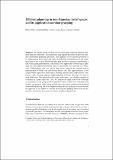Efficient Planning in Non-Gaussian Belief Spaces and Its Application to Robot Grasping
Author(s)
Platt, Robert; Kaelbling, Leslie; Lozano-Perez, Tomas; Tedrake, Russ
DownloadAccepted version (617.2Kb)
Open Access Policy
Open Access Policy
Creative Commons Attribution-Noncommercial-Share Alike
Terms of use
Metadata
Show full item recordAbstract
© Springer International Publishing Switzerland 2017. The limited nature of robot sensors make many important robotics problems partially observable. These problems may require the system to perform complex information-gathering operations. One approach to solving these problems is to create plans in belief-space, the space of probability distributions over the under-lying state of the system. The belief-space plan encodes a strategy for performing a task while gaining information as necessary. Most approaches to belief-space planning rely upon representing belief state in a particular way (typically as a Gaussian). Unfortunately, this can lead to large errors between the assumed density representation of belief state and the true belief state. This paper proposes a new sample-based approach to belief-space planning that has fixed computational complexity while allowing arbitrary implementations of Bayes filtering to be used to track belief state. The approach is illustrated in the context of a simple example and compared to a prior approach. Then, we propose an application of the technique to an instance of the grasp synthesis problem where a robot must simultaneously localize and grasp an object given initially uncertain object parameters by planning information-gathering behavior. Experimental results are presented that demonstrate the approach to be capable of actively localizing and grasping boxes that are presented to the robot in uncertain and hard-to-localize configurations.
Date issued
2016-08-26Department
Massachusetts Institute of Technology. Computer Science and Artificial Intelligence LaboratoryPublisher
Springer International Publishing
Citation
Platt, Robert, Kaelbling, Leslie, Lozano-Perez, Tomas and Tedrake, Russ. 2016. "Efficient Planning in Non-Gaussian Belief Spaces and Its Application to Robot Grasping."
Version: Author's final manuscript
ISSN
1610-7438
1610-742X